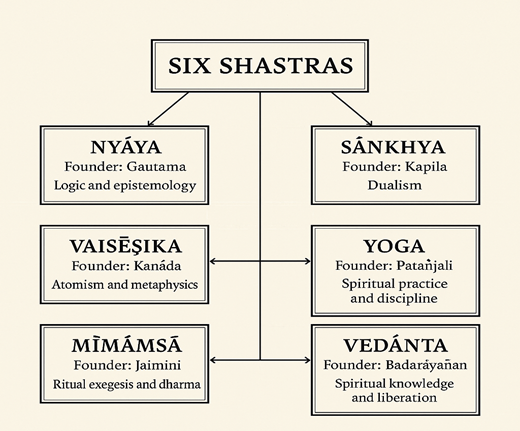Shastras
The Six Shastras (Ṣaḍdarśanas), also known as the Six Orthodox Schools of Hindu Philosophy, are foundational systems of thought in Indian philosophy. The term “Shastra” here refers to a body of knowledge or scripture, and these systems provide frameworks for understanding reality, consciousness, logic, liberation, and more.
1
Nyāya
(Logic and Epistemology)
- Founder: Sage Gautama (also called Akṣapāda)
- Core Text: Nyāya Sūtras
- Focus: Logic, epistemology (study of knowledge), and methodology for philosophical debate.
- Key Concepts:
- Pramāṇas (means of valid knowledge): Perception, inference, comparison, and verbal testimony.
- It emphasizes the tools of reasoning and critical thinking.
- Concerned with obtaining true knowledge to overcome suffering.
- Contributions:
- Laid the groundwork for Indian logic.
- Developed sophisticated theories of perception and inference.
Vaiśeṣika
(Atomism and Metaphysics)
2
- Founder: Sage Kaṇāda
- Core Text: Vaiśeṣika Sūtra
- Focus: Metaphysics and categorization of reality.
- Key Concepts:
- Padārthas (categories): Substance, quality, activity, generality, particularity, inherence.
- Belief in paramāṇu (atoms) as the basic building blocks of the physical world.
- Relation to Nyāya: Later merged with Nyāya due to overlapping interests in logic and metaphysics.
3
Sāṅkhya
(Dualism)
- Founder: Sage Kapila
- Core Text: Sāṅkhya Kārikā by Ishvarakrishna
- Focus: Dualistic metaphysics; explains the cosmos as the interaction between two eternal realities.
- Key Concepts:
- Purusha (consciousness) and Prakriti (matter) are distinct.
- The evolution of the universe is explained through the transformation of Prakriti.
- No belief in a creator God.
- Goal: Liberation through discriminative knowledge (Viveka) between Purusha and Prakriti.
Yoga
(Spiritual Practice and Discipline)
4
- Founder: Sage Patanjali (compiler of Yoga philosophy)
- Core Text: Yoga Sūtras
- Focus: Practical methods for spiritual realization and self-discipline.
- Key Concepts:
- Builds upon Sāṅkhya’s metaphysics but includes Ishvara (God).
- Ashtanga Yoga (Eight Limbs): Yama, Niyama, Asana, Pranayama, Pratyahara, Dharana, Dhyana, Samadhi.
- Aim is Kaivalya (liberation or isolation of the self).
- Significance: Basis for modern yoga as a spiritual and meditative practice.
5
Mīmāṃsā
(Ritual Exegesis and Dharma)
- Founder: Sage Jaimini
- Core Text: Pūrva Mīmāṃsā Sūtra
- Focus: Interpretation of the Vedas, especially the Brahmana sections (rituals).
- Key Concepts:
- Emphasis on Dharma (duty) as revealed in the Vedas.
- Ritual action (karma) is central to achieving desired results.
- Vedas are eternal and authorless (apauruṣeya).
- God is not emphasized—rituals themselves have inherent power.
- Sub-schools: Prābhākara and Bhāṭṭa schools.
Vedānta
6
(Spiritual Knowledge and Liberation)
- Founder: Sage Bādarāyaṇa (Vyasa)
- Core Text: Brahma Sūtras or Vedānta Sūtras
- Focus: Philosophical interpretation of the Upanishads, especially regarding the nature of Brahman (Ultimate Reality).
- Key Concepts:
- Liberation through knowledge of Brahman, the formless, infinite consciousness.
- Multiple sub-schools:
- Advaita Vedānta (Non-dualism): Śaṅkara – Brahman alone is real; the world is illusion (Māyā).
- Viśiṣṭādvaita (Qualified Non-dualism): Rāmānuja – Brahman is with attributes; the world and souls are real but dependent.
- Dvaita (Dualism): Madhva – Clear distinction between God (Vishnu) and soul.
- Aim: Moksha through self-realization and unity with Brahman.
Table of Summary
School | Founder | Focus | Key Text | View of God |
Nyāya | Gautama | Logic, knowledge | Nyāya Sūtras | Optional |
Vaiśeṣika | Kaṇāda | Atomism, metaphysics | Vaiśeṣika Sūtras | Optional |
Sāṅkhya | Kapila | Dualism, metaphysics | Sāṅkhya Kārikā | No God |
Yoga | Patañjali | Meditation, liberation | Yoga Sūtras | Accepts God |
Mīmāṃsā | Jaimini | Rituals, Dharma | Pūrva Mīmāṃsā Sūtras | Not central |
Vedānta | Bādarāyaṇa | Self-realization, Brahman | Brahma Sūtras | Central |
